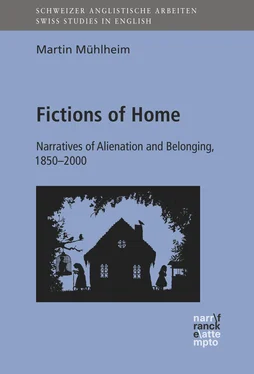HellerHeller, Anges emphasizes that communicationcommunication is facilitated by a “common cognitivecognition and cognitive background,” and Friedrich NietzscheNietzsche, Friedrich – who is otherwise notoriously skeptical about language and the value of communication (Grimm 24n26) – concedes that shared, lived experience greatly facilitates the exchange of ideas:
It is not sufficient to use the same words to understand one another: we must also employ the same words for the same kind of internal experiences, we must in the end have experiences in common . On this account the people of one nation understand one another better than those belonging to different nationsnations and nationalism, even when they use the same language; or rather, when people have lived long together under similar circumstances (of climate, soil, danger, requirement, toil) there originates therefrom an entity that ‘understands itself’ – namely, a nation. ( Beyond Good and Evil 213–214; § 268; original emphasis)43
NietzscheNietzsche, Friedrich’s remarks point to the eminently social nature of language, which acquires its meaning in reference to shared experiences, where words can be measured against their context in an intersubjective process of negotiation.44
To say that the seemingly immaterial homes of language and communicationcommunication are social phenomena necessarily implies that the ability to communicate is determineddetermination by decidedly material conditions. As Aijaz AhmadAhmad, Aijaz rightly insists, the idea of ‘determinationdetermination’ is not to be understood as implying an utter lack of human agencyagency; rather, it refers “to the givenness of the circumstance within which individuals make their choices, their lives, their histories” (6; original emphasis). For example, in SpielbergSpielberg, Steven’s film, E.T.’s ability to communicate with his fellow aliens is determineddetermination by the meager resourcesresources at his disposal: an electronic toy, an umbrella, and some other items he can find in Elliott’s home. If E.T. nevertheless manages to build a device that allows him to send a signal of distress to his fellow aliens, then it is reasonable to assume that he would have been able to construct a much more powerful and reliable device if he had been welcomed by his host society and given access to a wider range of resources. John Durham PetersPeters, John Durham is thus right in insisting that communication is not merely a question of semantics, but “more fundamentally a political and ethical problem” ( Speaking into the Air 30).
More generally, we can say that an individual’s possibilities for ‘home-makinghome-making,’ and specifically the odds for or against that individual’s ability to maintain multiple and spatially dispersed homes, change significantly depending on the social and material resourcesresources at hand. For instance, while some theorists celebrate nomadic identities as an alternative to oppressiveoppression power structures (e.g. DeleuzeDeleuze, Gilles, Difference and Repetition 45–47; DeleuzeDeleuze, Gilles and GuattariGuattari, Félix, A Thousand Plateaus , 60; see also TallyTally Jr., Robert T., MelvilleMelville, Herman, Mapping and Globalization 65–67), others emphasize that “the resources for selfself-invention are unequally distributed,” and that accordingly the nomadic identities of a select few, though intended to subvertsubversion oppressiveoppression power structures, in fact depend on these oppressiveoppression structures (PetersPeters, John Durham, “Exile, Nomadism, and Diasporadiaspora” 34). Likewise, BluntBlunt, Alyson and DowlingDowling, Robyn have pointed out that the creation and maintenance of diasporicdiaspora homes is greatly facilitated by easy access to particular types of mediamedia and communicationcommunication (206; see ManningManning, Patrick 160). Moreover, given the importance for diasporicdiaspora communities of everydayeveryday ritualsritual of food preparation and consumptionconsumerism and consumption (BluntBlunt, Alyson and DowlingDowling, Robyn 216), it is clear that those who cannot afford the foodstuffs required are also excluded from communal ritualsritual. We will revisit such considerations of the link between communitycommunity, ritualsritual, and forms of communication – as well as humankind’s relation to the natural world (e.g. through the construction of a pastoralpastoral space) – in the discussion in chapter six of Jeffrey EugenidesEugenides, Jeffrey’s The Virgin Suicides.
Knowing Home: The Uses and Abuses of Defamiliarization
By way of concluding this introductory chapter, we need to explore briefly the importance of conventionsconventions for establishing a sense of home (as well as, more generally, the relation between home, familiarityfamiliarity, and knowledgeknowledge). Commenting on the role of conventions, Theano S. TerkenliTerkenli, Theano S. insists that it is precisely through repetitionrepetition, routine, and ritualritual that we turn places into homes:
[H]abits that repetitively unfold in specific contexts differentiate these locales or circumstances from the rest of the known world. […] Over time an individual develops numerous behavioral, cognitivecognition and cognitive, and affective routines by investing resourcesresources and emotional commitment. The same process occurs at a group level in the creation of a collective home in the form of a common cultural background and a common homelandhomeland. (326)
The conventionsconventions and routines of home thus allow us to save both cognitivecognition and cognitive and affective energies, thus making it possible for us to employ these psychic energies for other purposes. This idea is not of recent origin, for as early as 1815, Percy Bysshe ShelleyShelley, Percy Bysshe argued in his essay “On Life” that the “wonder of our being” is in a sense far too great, and that therefore we depend on a “mist of familiarityfamiliarity” that shields us “from an astonishment which would otherwise absorb and overawe” (633). In other words, the limited economyeconomy of psychic life renders familiarity eminently desirable.
At the same time, however, too much familiarityfamiliarity may blind us to the world around us, which is why the Russian FormalistsRussian Formalism and others before them insisted on a need for carefully administered doses of defamiliarizdefamiliarizationation. The concept of defamiliarization or ostranenie (‘making strange’) was introduced by Victor ShklovskyShklovsky, Victor in 1917 in an essay entitled “Art as Technique.” In this essay, ShklovskyShklovsky, Victor suggests that when “perception becomes habitualhabits and the habitual,” it retreats “into the area of the unconsciously automatic” (19). To combat the resulting mental numbness, art must attempt to ‘de-habitualize’ perception:
The purpose of art is to impart the sensation of things as they are perceived and not as they are known. The technique of art is to make objects ‘unfamiliar,’ to make forms difficult, to increase the difficulty and length of perception because the process of perception is an aestheticaesthetic end in itself and must be prolonged. (20)
According to ShklovskyShklovsky, Victor, it is the form in which an object is presented in the work of art that forces us to perceive this object as if we were “seeing it for the first time” (21). In this way, defamiliarizdefamiliarizationation may reveal the strangenessstrangeness that lies hidden at the heart of the familiarfamiliarity – an idea that has prompted Nicholas RoyleRoyle, Nicholas to observe that defamiliarizdefamiliarizationation bears more than a passing resemblance both to FreudFreud, Sigmund’s notion of the uncannyuncanny and to the Heideggerian concept of existentialexistential & existential angst/trauma angst (4). Likewise, RoyleRoyle, Nicholas points out, the idea that defamiliarizdefamiliarizationation may revolutionize our way of perceiving the world underpins Bertolt BrechtBrecht, Bertolt’s concept of a Verfremdungs- or alienation effectalienation effect (5).45 This point, too, had already been developed by Percy Bysshe ShelleyShelley, Percy Bysshe, in his 1821 essay “A Defence of Poetrypoetry”:
Читать дальше












